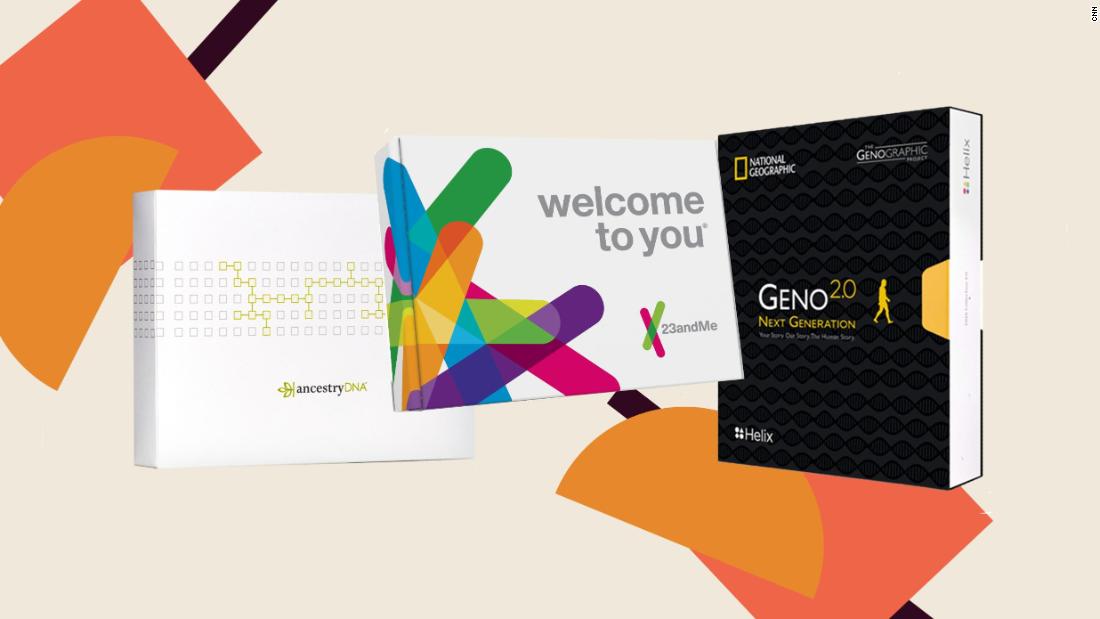
At-home DNA testing kits have surged in popularity recently, due to their affordability and ease of use, as well as the sheer number that are available to shop right now.
Different brands have different capabilities in terms of the information they can extract. Some can give you insight into your ancestors' migration patterns. Others can help you track down living relatives you may have never known about. Some kits can even tell you which diseases or health complications you may be at risk for.
The variety of DNA testing kits out there has made shopping for the right one tricky business. We've broken down three of the most popular, to help you better understand exactly what each kit does, what you should look for while shopping for an at-home DNA kit, and which brand is right for you. The idea is to help simplify your search so you can spend less time shopping and more time uncovering your family history.
Ahead, learn more about this popular product and see which kit suits you best.
What exactly do DNA testing kits do?
DNA at-home testing kits can give you an idea of how your ancestors migrated over time by breaking down the ethnicities present in your own strands of DNA. These kits can also potentially give you other information, depending on the brand, but more on that later.
At their core, DNA testing kits rely on analyzing a person's 22 autosomes (the numbered chromosomes, as opposed to the X and Y sex chromosomes). This type of analysis can help break down the different ethnicities that are present in your DNA, and can also help pinpoint common genetic traits like the diseases you might be at risk for. The charts and maps you'll receive are based on autosomal testing.
There are other types of testing that some, but not all, kit companies can do. This includes mtDNA testing, which traces the mother's lineage, and Y-DNA testing, which focuses on the paternal line. (Autosomal testing can't differentiate between the two.) Essentially, different types of testing can yield different results.
It is important to note that these tests are almost never 100% accurate.
How does the at-home testing work?
Once you purchase your at-home DNA test kit, you'll register the kit online -- arguably the most important step of the process, because the only way you can view your results is by registering your kit prior to shipping it back. After you've registered it, you'll put a DNA sample (saliva) into a box and send it to the designated lab for testing. Some of the kits feature free shipping (like Ancestry) while others like 23andMe tack on an additional charge for shipping.
In a matter of weeks, your online portal will be updated with results that can show you sample migratory maps, pie charts of your ethnic breakdown, and potentially health information.
Which DNA testing kit is right for me?
As mentioned above, not all at-home DNA testing kits offer the same tests. We've broken down some of the more popular ones below and who they're the best fit for.
Ancestry DNA: One of the most popular kits out there is Ancestry DNA. This kit assesses your genetic makeup to pinpoint your connection to 350 regions of the world. After six to eight weeks for the lab to process the sample, users will be able to log in to their online portals to check out interactive maps and charts of their heritage. Where AncestryDNA differs from other kits on the market is that the site also matches up DNA to people who may be distant relatives. From there, you can tap into Ancestry's massive collection of online records, databases and more to map out a more comprehensive family tree. In total, the kit costs $99 and includes free shipping.
Who is this perfect for? Those who are looking to really fill out their family tree on top of learning where their ancestors came from.
23andMe: Much like Ancestry DNA, 23andMe will give you your genetic breakdown, along with a map of where your family may have traveled from. 23andMe also features four tests that you don't get from Ancestry: genetic health, carrier status, wellness and traits testing. When you receive your reports, you'll get information on how your genes can affect your overall health and well-being, as well as how they have affected your traits such as taste, smell and facial features. The carrier status report (which meets FDA requirements) is designed to help you find out if you're predisposed to an inherited condition. Other information you'll receive includes your Neanderthal ancestry, and a maternal and paternal halogroup report. Because there's much more involved in this particular kit, the price of 23andMe's Ancestry + Health Service is $199.
Who is this perfect for? People who are extremely curious about how their genes affect all areas of their lives, including family history and wellness.
National Geographic DNA Test: Rounding out our list of DNA kits is National Geographic's DNA Test (powered by Helix). This kit's main focus is mapping out your regional ancestry by percentage, going as far back as 500,000 years. It comes with custom video features so you can get even more insight into your DNA results, as well as an integrated app for sharing your results with friends and family. Another interesting feature of this kit is the fact that it can map out which historical geniuses you could be related to (like Benjamin Franklin or Nikola Tesla, for instance). While it's not as comprehensive as a kit like 23andMe's, it's fun, insightful and very affordable. The kit currently rings in at just under $70.
Who is this perfect for? History buffs who want to see which famous thinkers they could be related to, as well as people who are curious about their lineage but aren't looking to shell out a ton of money on a kit.
from CNN.com - RSS Channel https://cnn.it/2U5NKOK
No comments:
Post a Comment